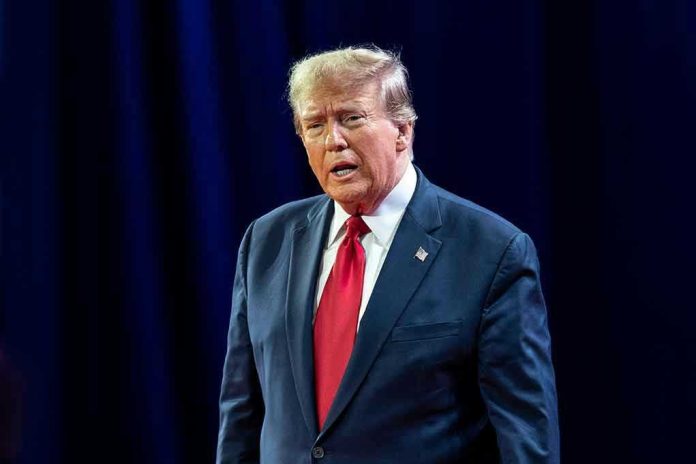
President Trump’s push to reclaim Bagram Air Base signals a dramatic U-turn on U.S. defense priorities, igniting debate over America’s global posture and national security after years of perceived weakness and costly missteps.
Story Snapshot
- Trump publicly outlines reasons for seeking to regain control of Afghanistan’s Bagram Air Base, emphasizing U.S. security and strategic interests.
- The move is framed as a response to the fallout from previous administrations’ withdrawal policies and rising threats in Central Asia.
- At a high-profile press conference with UK Prime Minister Keir Starmer, Trump stresses the need for robust defense, energy independence, and renewed U.S.-UK cooperation.
- Underlying tensions remain over global controversies, but both leaders signal intent to project strength and unity.
Trump’s Call to Retake Bagram: Security First
During the joint press conference at Chequers, President Trump addressed a matter that has frustrated many Americans since the chaotic Afghanistan withdrawal: the loss of Bagram Air Base. Trump explained that regaining Bagram is not just symbolic—it is a strategic imperative. Citing the airfield’s proximity to China and its legacy as a U.S.-built stronghold, Trump argued that leaving it in enemy hands undermined regional security and emboldened U.S. adversaries. This stance directly rebukes the policies of the previous administration, which many believe weakened America’s global standing and exposed the homeland to new risks.
Trump’s remarks resonated with a conservative audience wary of globalist decisions and eager for renewed American strength. By framing the Bagram issue as one of national defense and constitutional responsibility, Trump tapped into widespread concerns about border security, unchecked government spending, and the erosion of U.S. sovereignty. He emphasized that the air base’s advanced infrastructure, built with billions of taxpayer dollars, never should have been abandoned. The administration’s current efforts to reclaim Bagram are thus seen as a corrective to past negligence and a step toward restoring America’s military edge.
Energy, Free Speech, and the US-UK Alliance
Beyond Afghanistan, the Chequers press conference highlighted other issues central to conservative values. Trump criticized the previous administration’s energy policy failures, calling wind power an expensive “joke” and championing North Sea oil as a model for resource independence. Prime Minister Starmer, while cautious, acknowledged the need for a balanced approach but did not fully align with Trump’s pro-fossil fuel stance. On free speech, Trump dismissed claims that high-profile media cancellations were unrelated to censorship, reinforcing his commitment to First Amendment principles. These exchanges reflected deep divisions over energy, speech, and the proper role of government—divisions that remain highly relevant to American voters.
Trump and Starmer also addressed uncomfortable controversies, including questions about political scandals and the firing of the UK ambassador to Washington. Both leaders managed these topics with diplomatic caution, prioritizing alliance stability over open confrontation. While no major policy breakthroughs emerged, the event projected an image of renewed transatlantic cooperation, even amid unresolved tensions. For conservatives, this signals a return to principled leadership and a rejection of past weakness on the world stage.
Strategic Implications and Conservative Concerns
The efforts to recover Bagram Air Base and strengthen U.S.-UK ties have far-reaching implications. In the short term, Trump’s assertive approach reassures those who demand a government that protects American interests first. The focus on defense and energy independence directly addresses core concerns over national security, economic stability, and constitutional rights. In the long term, the administration’s posture may deter adversaries and encourage allies, but it also raises questions about the sustainability of renewed overseas commitments and the risks of entanglement. Conservatives watching these developments will be alert for any policies that threaten gun rights, family values, or national sovereignty—committed to ensuring that America’s priorities remain firmly rooted in its founding principles.
Trump reveals why the US is trying to get back Bagram Air Base https://t.co/qQJ8z47my0 pic.twitter.com/bXcILO3G37
— TheBlaze (@theblaze) September 18, 2025
The Chequers summit, while diplomatic in tone, underscored the ongoing struggle to restore American strength after a period marked by globalist overreach and domestic mismanagement. Trump’s focus on Bagram, energy, and free speech is likely to shape both U.S. policy and the broader conservative agenda in the months ahead.
Sources:
White House official video, Sep 18, 2025
White House press gaggle, Sep 18, 2025




